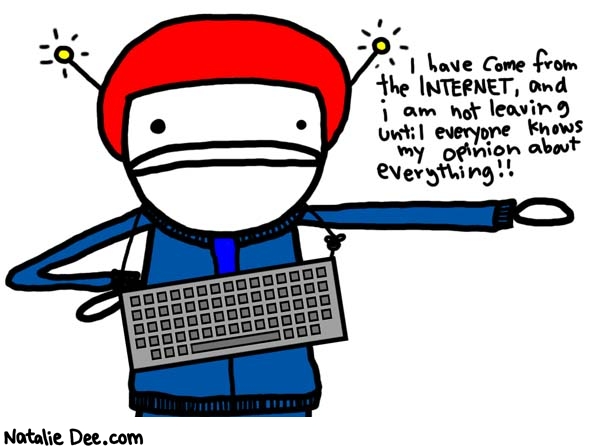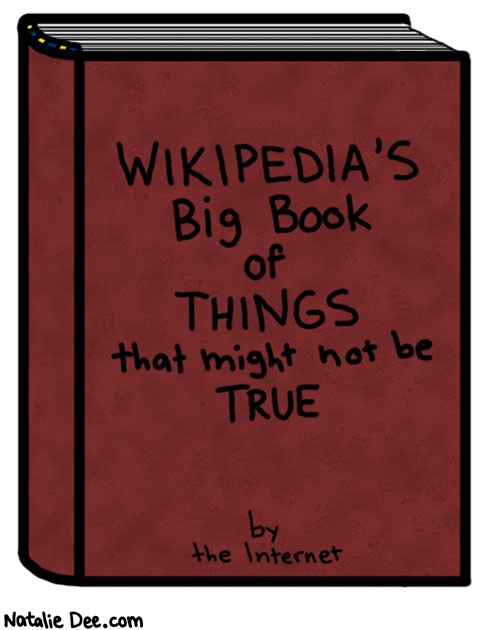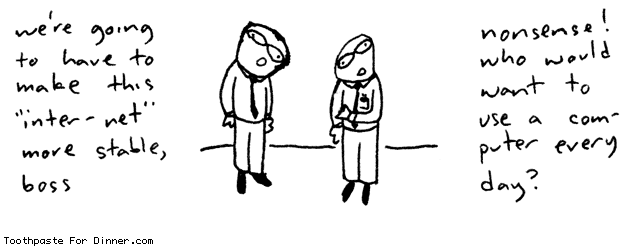Tv-Links has been shut down! No more record of tv shows available on the interned!
Pros:
If not technically illegal, still a little unethical
Cons:
Was awesome.
This won't stop people from creating similar sites, and may in fact drive them to create more sites, as an act of defiance to thos trying to limit and chain in the accessibility inherent in the internet.
Wednesday, October 24, 2007
Sunday, October 21, 2007
How this sucker actually plays out

nataliedee.com
Due to the fact that part of our assignment (see below) was to comment on our peers' blogs, I found myself perusing the past and present musings of some of my fis classmates, some of whom I know in real life, and some of whom I did not.
Wednesday night, for example, I posted on Nathaniel's blog. Thursday morning we found ourselves in a Management of Information Organizations work group, and met in person for the first time, although our online identities had been (it turned out) corresponding for weeks regarding student council elections.
It is awfully easy to detach reality from Internet exchanges. One does not (often because it is impossible) have a picture of a real person in mind when they interact on the Internet. You interact with a hazy image, a head with no determined features, rather than an individual, with a face, and an identity discerned from and linked to their physical persona.
This is beating the dead horse of the self beyond exterior appearance, but it is brought home quite forcefully when you meet the people with whom you have only had online interactions, or, in contrast, with whom you have only had real life interactions.
Due to the genius of Google reader, I came across a friend's blog. A fis classmate, and fellow student council member, I have hung out with him, greeted him in the halls, and together thrown student council events. His virtual persona revealed aspects of his personality and thought processes which our real life interactions had not. The coupling of virtual and actual identity revealed a more complete picture of his personality, but one to which I had not been officially sanctioned to experience. I found his blog by chance, and was provided with information which I had not been given permission to receive. Seeing him in person, I felt guilty, because I had learned about him without his knowledge.
I'm not sure what to conclude about this- this melding of virtual and physical identities. "Meeting" people first on the Internet allows for interaction without the possible hindrances of cliques, appearance, age, or prejudice, and, in those areas, is surely a boon to meritocratic relations. One is perceived by their intellectual ability, and their mastery of language. However, that is not the complete tale of one's self, and when you are not privy to the rest of a person's identity, can you actually be said to know them?
I'm going to stop now, because even I am becoming bored with my own pretentious musings.
Wednesday, October 17, 2007
Library 2.0?
My fis 1311 class just wrote papers on whether or not libraries matter, based on the article: Chad, K. and Miller, P. (2005). “Do Libraries Matter? The Rise of Library 2.0” Talis, Nov 2005, retrieved October 16 ,2007 from http://www.talis.com/applications/downloads/white_papers/DoLibrariesMatter.pdf
I'm posting my introduction and conclusions from that paper here, for your reading enjoyment.
Introduction and Initial Observations
Do Libraries Matter?, an article by Ken Chad and Paul Miller, is a white paper which promises to explain “the rise of Library 2.0.” The title and subtitle imply that Libraries as they are, Library 1.0, if you will, are operating as an outdated model, one which needs to evolve in order to remain relevant. The “2.0” of the subtitle implies that, as the authors go on to argue, technology will play a key role in their ideas for the future of libraries. Chad and Miller argue that the historical role of the library as our culture’s primary information providing service has been upstaged by the technology of sites such as Amazon and Google. It further claims that, in order to regain their role, libraries must join the ranks of open-sourced, web-based applications, providing hybridized applications and participative platforms” as their primary services to users. (Chad, Miller, 2005, p. 7)
This paper will argue that whilst web 2.0 initiatives can be useful as part of a library’s user interface, libraries do matter. It will also argue that perhaps Chad and Miller are throwing the baby out with the bathwater as they map their “evolutionary change” in libraries with little or no concern for the worth of the current historical institution. It will further argue that the innovations and motivations of the authors are linguistically and ethically flawed, and thus, the worth of the article is severely compromised. Chad and Miller appear to be creating an unwarranted feeling of fear in their readers in order to sell their company’s soon-to-be-released Library 2.0 products.
This “white paper” is, according to Jenny Levine and Michael Stephens, the intellectual trickle which began the now overwhelming waterfall of articles and publications on Library 2.0. (Levine, Stephens, 2007) This policy outline has spawned a large collection of published and unpublished works on Library 2.0 in the past two years. It remains prominent in the historiography of the subject as one of the first papers to deal with the “social and technological changes” which can be accessed and manipulated by libraries to better serve their users through web interfaces. (Miller, 2006, p. 1)
Conclusions: Good Ideas, Bad Frame
Library 2.0 is an interesting and innovative concept, and it would behoove librarians to take a hard look at the software which creates the web presence of their institution and examine it with a view towards an open source future. Librarians ought also to begin to imagine libraries without physical libraries, where information exists primarily in the realm of the virtual, and where the reference desk has become the reference instant message. As Web 2.0 brings more accessible software, better data management systems and more lightweight user interfaces, libraries ought to take advantage of these resources to better serve their users. Many interlibrary loan systems, to borrow an example for Chad and Miller, could use an overhaul with software that better monitors the movement of books, or operates on a larger scale, providing more access to more users.
Library 2.0 should not however, become a way for library users to become consumers. Libraries are primarily public service institutions, which have mandates to provide access to their resources, not to sell their users’ data to the highest bidder, or to drastically change their collections practices because of provocative white papers. Chad and Miller made valid points in encouraging libraries not to shy away from technology, and even in their policy to systematically embrace the opportunities of web 2.0, but they undermine their arguments when they over zealously dismiss books and people, both of which have been around much longer than the internet.
An aside conclusion is that papers seem way more authoritative when they are single spaced. Perhaps good to know for further work.
I'm posting my introduction and conclusions from that paper here, for your reading enjoyment.
Introduction and Initial Observations
Do Libraries Matter?, an article by Ken Chad and Paul Miller, is a white paper which promises to explain “the rise of Library 2.0.” The title and subtitle imply that Libraries as they are, Library 1.0, if you will, are operating as an outdated model, one which needs to evolve in order to remain relevant. The “2.0” of the subtitle implies that, as the authors go on to argue, technology will play a key role in their ideas for the future of libraries. Chad and Miller argue that the historical role of the library as our culture’s primary information providing service has been upstaged by the technology of sites such as Amazon and Google. It further claims that, in order to regain their role, libraries must join the ranks of open-sourced, web-based applications, providing hybridized applications and participative platforms” as their primary services to users. (Chad, Miller, 2005, p. 7)
This paper will argue that whilst web 2.0 initiatives can be useful as part of a library’s user interface, libraries do matter. It will also argue that perhaps Chad and Miller are throwing the baby out with the bathwater as they map their “evolutionary change” in libraries with little or no concern for the worth of the current historical institution. It will further argue that the innovations and motivations of the authors are linguistically and ethically flawed, and thus, the worth of the article is severely compromised. Chad and Miller appear to be creating an unwarranted feeling of fear in their readers in order to sell their company’s soon-to-be-released Library 2.0 products.
This “white paper” is, according to Jenny Levine and Michael Stephens, the intellectual trickle which began the now overwhelming waterfall of articles and publications on Library 2.0. (Levine, Stephens, 2007) This policy outline has spawned a large collection of published and unpublished works on Library 2.0 in the past two years. It remains prominent in the historiography of the subject as one of the first papers to deal with the “social and technological changes” which can be accessed and manipulated by libraries to better serve their users through web interfaces. (Miller, 2006, p. 1)
Conclusions: Good Ideas, Bad Frame
Library 2.0 is an interesting and innovative concept, and it would behoove librarians to take a hard look at the software which creates the web presence of their institution and examine it with a view towards an open source future. Librarians ought also to begin to imagine libraries without physical libraries, where information exists primarily in the realm of the virtual, and where the reference desk has become the reference instant message. As Web 2.0 brings more accessible software, better data management systems and more lightweight user interfaces, libraries ought to take advantage of these resources to better serve their users. Many interlibrary loan systems, to borrow an example for Chad and Miller, could use an overhaul with software that better monitors the movement of books, or operates on a larger scale, providing more access to more users.
Library 2.0 should not however, become a way for library users to become consumers. Libraries are primarily public service institutions, which have mandates to provide access to their resources, not to sell their users’ data to the highest bidder, or to drastically change their collections practices because of provocative white papers. Chad and Miller made valid points in encouraging libraries not to shy away from technology, and even in their policy to systematically embrace the opportunities of web 2.0, but they undermine their arguments when they over zealously dismiss books and people, both of which have been around much longer than the internet.
An aside conclusion is that papers seem way more authoritative when they are single spaced. Perhaps good to know for further work.
Virtual Music Teachers?
The rich suburban towns in the greater Boston area are using computers to teach music.
Sunday, October 14, 2007
Wikipedia
Wikipedia is slowing down. People (especially Bloggers) are spazzing, and dividing into camps.
However, it seems to me as thought there ought to be a slowdown, or at least movement towards a plateau, as most of the bases get covered. Is this just me?
However, it seems to me as thought there ought to be a slowdown, or at least movement towards a plateau, as most of the bases get covered. Is this just me?
Friday, October 5, 2007
Sweet sweet diskettes of personal information
Well done, Boston. Way to keep social security numbers private.
"We are taking steps that will insure that such an incident can not occur again."
"We are taking steps that will insure that such an incident can not occur again."
Subscribe to:
Posts (Atom)

